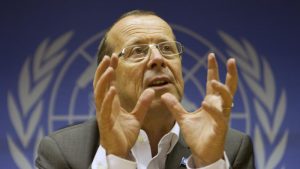The Mediterranean region and the EU foreign policy: a modern Odissea
External Relations 12 February 2017“It is more and more evident in our region that the way to solve conflicts, manage crises, prevent tensions is more regional integration and more regional cooperation,” Mogherini said on January the first, following the ministerial meeting of the Union for the Mediterranean. The Union brings together 43 countries from across the region with an overall population of about 800 million people. Mogherini played a fundamental role during the last session held in January in Barcelona, co-chairing the meeting with Jordanian Foreign Minister Ayman Safadi.
The new Global Strategy, granted by High Representative Mogherini in 2015, crucially focuses on Mediterranean area and it is aimed at coping with three relevant topics related to Mediterranean.
First of all, the objective of a new Mediterranean strategy is to foster economic development of the region, guaranteeing that “societies are open societies with a space for each and every citizen”, HR said. In a second stance, HR Mogherini explained to the assembly the role that the EU wants to play in order to effectively manage migration flows, and to prevent radicalisation – interpreted as a major threat for the EU itself, given the instability of the Balkans’ region, where radicalisation appears to be endemic. Directly linked to these main goals, the EU wants increase cooperation in managing those security concerns shared by all the 43 members of the Union.
In her Global Strategy for the European union, HR Mogherini identified the Union for the Mediterranean as a crucial partner in bringing stability and peace to the Mediterranean region, bridging the European continent with the African and eastern shores. In the view of deepening cooperation and integration between Mediterranean banks, while in Barcelona, HR Mogherini and other representatives adopted a Road Map for future work. This last meeting in Barcelona fueled the intentions of all members to join a common cause, committing together to fix the lack of integration and tensions, while investing in a coherent way on more political dialogue (bilateral and multilateral partnership) and more regional integrational cooperation on very concrete fields (for example: fisheries, agriculture, migration flows, deradicalisation) of actions through the Union for the Mediterranean.
In a more and more vexed and unstable political context in the region, the EU foreign ministers met in Brussels (6 February) in order to discuss over the situation in Libya, looking beyond topics like migration, and focusing onto the EU’s support to the political process there. Ministers had discussions also on Egypt and the EU’s work on the Middle East Peace Process. The situation in facts, it is not easy at all. First, immigration will be one of the main challenges that the European Union will have to face this year. The main reason is the fact that Turkey is threatening to put an end to the treaty agreed with the EU last March 2015, after which the number of migrants who flooded into Europe across the Aegean Sea began to rapidly reduce. Second, Libya, where Al-Sarraj’s government is struggling to establish control in Tripoli and beyond and is contested by various factions, including by the powerful warlord Khalifa Haftar in eastern Libya, who is increasingly being courted by Russia. In the days before the Foreign Affairs Council in Brussels, the western-backed Prime Minister Al-Sarraj, in a bilateral meeting with President Tusk, has complained that his country is only receiving “very small amounts” from the EU, ahead of a key summit on the central Mediterranean migration route on Friday (3 February) in Malta. Further meetings with HR Mogherini led to a sort of compromise in defining new forms of support to Libya. This support has been defined not only as an increase in the amount of effective aids, rather than an improvement of the instruments already put in place between the two sides of Mediterranean. Third, the Turkish-Greek crisis exploded a few days after Greek and Turkish Cypriot leaders met at UN in Geneva for direct talks on reunification under a federal arrangement, in January. Even if independent from the Cyprus-issue, the incident has made things getting a little crazy last month. In very few words, a Turkish warship approached on January 29th the Greek island of Imia, triggering strong reactions from Greek authorities. Officials in Athens suggested that the incident was a symbolic move before the anniversary of the Imia crisis when the two countries came on the verge of an armed conflict in 1996.
The newly inaugurated Maltese presidency set out a clear program of six priorities. Migration, the single market, security, social inclusion, Europe’s neighbourhood and maritime policies. As far as European external policy is concerned, Malta is pushing for a holistic approach to migration. Furthermore, the presidency aims to leverage the European external investment plan to promote sustainable investment in Africa and the neighbourhood, so tackling the causes of migration to the European continent. The international security landscape, and terror attacks inside the European Union, motivated the presidency to run for better management and organization of the EU’s external borders, to effectively counterattack the threats coming from migration, terrorism and other hybrid threats. Malta informed as well that the presidency will insist on a new system of travel information and authorisation and better interstate cooperation on criminal justice.
In this direction, the European Union continues to invest in development policies across Mediterranean, in order to build strong relations and a more stable political context across the region. The EU has in facts recently announced aid worth €225m on Thursday (9 February) for The Gambia’s new government – as President Adama Barrow said his nation was “virtually bankrupt” due to economic mismanagement by the former regime of President Jammeh.

MONUSCO/ Flickr


